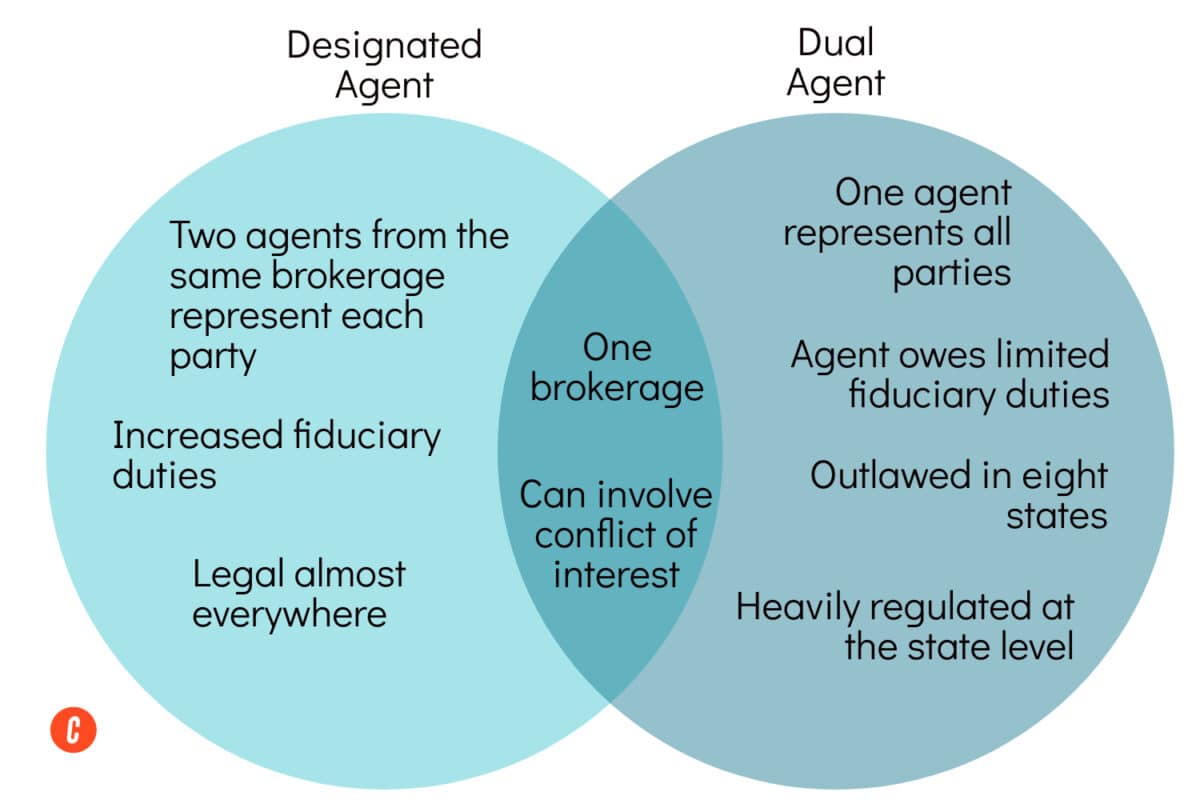Whether you think it’s great, less-than-ideal, or completely unethical, there’s no question that dual agency is a tricky situation to navigate. Dual agency is when a single real estate agent represents both the buyer and the seller in the same transaction. It can also refer to a transaction where the same real estate team or brokerage simultaneously represents both the buyer and seller.
We’re going to explore deeper into what dual agency is, where it’s legal, and examine some of its most significant benefits and drawbacks. Plus, having been in a dual agency situation myself, I can offer some first-hand warnings—and tips for success.
If you’re looking for a dual agency disclosure template, we’ve developed one for you to customize for your clients. Always remember to review it with your broker to ensure it meets your state’s specific disclosure requirements.
Download Dual Agency Disclosure TemplateWhat Is Dual Agency versus Designated Agency?
Dual agency is when the same agent represents both the buyers and the sellers in a real estate transaction.
It’s crucial to remember that dual agency also occurs when two salespeople on the same team or brokerage represent opposing parties in a transaction. Because contracts are ultimately handled by the broker and covered under the broker’s license, it’s technically dual agency, even if the contracts are negotiated and drafted by two different agents.
The work-around here is designated agency (sometimes called appointed agency), where two agents from the same brokerage represent each of the two parties in a transaction. Even though most of the traditional fiduciary duties remain intact, a conflict of interest may still exist.

There is also the option of engaging a transaction broker: a third party who does not represent the buyer or the seller but acts as a mediator and moves the real estate transaction along. Some states allow for this facilitator to progress the transaction and operate without the traditional fiduciary duties one would find in an agency relationship.
Where Is Dual Agency Legal?
Dual agency is legal, albeit heavily regulated, across the country—except for eight states: Alaska, Colorado, Florida, Kansas, Maryland, Oklahoma, Texas, and Vermont. Click on your state in the map below to learn more about whether designated agency is legal and what kind of disclosure and client consent is required.
In states where dual agency is legal, it’s formally regulated through contract law and at the state licensing level. Each state outlines how agents navigate maintaining their fiduciary duties in a dual agency situation, since it often results in limited duties owed to both buyers and sellers.
Dual and designated agency are both legal. Agents should get written consent (but are not legally required to do so).
Dual agency is not legal. Designated agency is legal.
Dual and designated agency are both legal. Written consent is required.
Dual and designated agency are both legal. Verbal consent is required.
Dual and designated agency are both legal. Written consent is required.
Dual agency is not legal. Designated agency is legal.
Dual and designated agency are both legal. Written consent is required before showing the property to a buyer.
Dual and designated agency are both legal. State assumes consent is given by both parties by default.
Dual and designated agency are both legal. Written consent is required.
Dual agency is not legal. Designated agency is legal.
Dual and designated agency are both legal. Written consent is required.
Dual and designated agency are both legal. Written consent is required.
Dual and designated agency are both legal. Written consent is required.
Dual and designated agency are both legal. Written consent is required.
Dual and designated agency are both legal. Written consent is required.
Dual and designated agency are both legal. Written consent is required.
Dual agency is not legal but transactional representation is legal.
Dual and designated agency are both legal. All parties must sign form explaining the different types of representation.
Dual and designated agency are both legal. Written consent is required.
Dual and designated agency are both legal. Written consent is required.
Maryland defines dual agency as designated agency and it is legal with written consent; one agent representing two parties is not legal.
Dual and designated agency are both legal. Written consent is required.
Dual and designated agency are both legal. Written consent is required.
Dual and designated agency are both legal. Written and verbal consent is required.
Dual and designated agency are both legal. Written consent is required.
Dual and designated agency are both legal. Written consent is required.
Dual and designated agency are both legal. Written consent is required.
Dual and designated agency are both legal. Written consent is required.
Dual and designated agency are both legal. Written consent is required.
Dual and designated agency are both legal. Written consent is required at first meeting with either party.
Dual and designated agency are both legal. Written consent is required before signing agreement with the agent.
Dual and designated agency are both legal. Written consent is required prior to submitting written offers.
Dual and designated agency are both legal. Written consent is required.
Dual and designated agency are both legal. Written consent is required.
Dual and designated agency are both legal. Written consent is required before transaction closes.
Dual and designated agency are both legal. Written consent is required before signing agreement with the agent.
No dual or designated agency. Agents can be single agency or transaction brokers.
Dual and designated agency are both legal. Written consent is required.
Dual and designated agency are both legal. Written consent is required.
Dual and designated agency are both legal. Written consent is required before making an offer.
Dual and designated agency are both legal. Written consent is required.
Dual and designated agency are both legal. Written consent is required after explaining the limitations of dual agency at first substantive meeting.
Dual and designated agency are both legal. Written consent is required.
Dual agency is not legal; but an agent could be considered a designated representative who represents a customer.
Dual and designated agency are both legal. Written consent is required.
Dual agency is not legal. Designated agency is legal.
Dual and designated agency are both legal. Written consent is required before signing agreement with the agent.
Dual and designated agency are both legal. Written consent is required.
Dual and designated agency are both legal. Written consent is required before signing agreement with the agent.
Dual and designated agency are both legal. Written consent is required before signing agreement with the agent.
Dual agency is not legal. Designated agency is legal.
A Story of Dual Agency
Long before I took my real estate exam, I was a homebuyer. A little property popped up that was perfect: the right price, the right location, the right charm—but I was sure that I wasn’t the only one who’d noticed. Instead of researching local Realtors and engaging one to be my buyer’s agent, I rushed to call the listing agent. He scheduled a showing. I viewed, I loved, I was ready to make an offer. And just like that, the agent, the seller, and I found ourselves in a dual agent situation.
Fortunately, this wasn’t my agent’s (the seller’s agent?) first rodeo, and I got the house. Looking back, perhaps I had an advantage over other buyers. I did notice that the process was definitely streamlined since it involved only one agent. The seller apparently even saved a little on commission. But the pitfalls were numerous, and even in a situation where everyone wanted to act with integrity, lines were inherently blurred.
In the negotiation process, for example, I kept wondering if my agent’s side-eye and well-timed coughs were code for “offer more.” The seller paid less commission but later complained to the neighborhood that he should have gotten a higher sale price. While the end result was what I’d wanted, there was a nagging feeling that, because pure market forces weren’t at work, maybe none of us got the deal we should have gotten.
Advantages of Dual Agency
There are some real benefits to dual agency for all parties involved.
Potential Cost Savings for the Seller
Dual agency can be an opportunity to entice sellers by offering a lower commission. It isn’t uncommon to see listing agreements in dual agency states with language like “… commission for this sale will be 6% of the final sale price unless the listing agent also brings the buyer, in which case, the total commission would drop to 4.5%.” This sort of discount could be tens of thousands of dollars.
Possible Increase in Agent’s Commission
A dual agency transaction is highly desirable to real estate agents because they capture both sides of the commission rather than splitting it with another agent. Adding an additional commission’s worth of income to your balance sheet is like getting a massive raise. Even if you reduce the overall commission by 25%, like I just mentioned, that is still a significant addition to your bottom line.
Faster, More Efficient Communication
Miscommunication, or lack of communication, is one of the biggest complaints buyers and sellers have when it comes to getting a transaction across the finish line. Crossed wires happen more often than I think most agents would care to admit. A seller will mention something to their agent; that agent will interpret it and maybe add their own spin when communicating it to the buyer’s agent. By the time it reaches the buyer, the context may have shifted, even if the words remain the same. When a single agent manages all communications, they act more as an intermediary, so messages are delivered faster and hopefully more objectively.
Better Organization
If you haven’t received a frantic text from an agent at 11 p.m. asking for a listing agreement or another copy of the seller’s disclosure statement, you probably haven’t been in real estate very long. When two parties have to manage paperwork, deadlines, and the scheduling of important events, it’s often twice as difficult to get it right and do it efficiently.
Say you’ve got a property under contract and the inspection needs scheduling. First, the buyer needs to let the inspector know when they’d like to have the inspection. Next, the inspector has to communicate with the buyer’s agent, who then communicates with the seller’s agent, who then communicates with the seller. With a single agent in the mix, one person can streamline the entire process, making it more efficient and easier to get everyone on the same page.
Dual Agency Disadvantages
There are also some downsides to dual agency, which is why it’s outlawed in some states. If you work in a state that allows dual agency, make sure you’ve got an answer to these concerns before entering into a transaction where you’re representing both parties. They’ll almost certainly come up.
Inherent Conflict of Interest
As a Realtor working as a seller’s agent, the NAR Code of Ethics compels you to present all offers received on a property to your seller. If a real estate agent has a financial stake in which offer their client accepts, they might present that offer in a better light, even if it’s subconscious. Is this legal? No. Is it ethical? Nope. Is this a scenario that is difficult to regulate in states where dual agency is legal? Absolutely.
Even with the conscious intention of presenting all offers in a fair and unbiased way, a real estate agent could have a hard time avoiding subtle cues to encourage their clients to choose a particular offer. Thus, it presents a major conflict of interest.
Limited Ability to Advise
I like to think of us real estate agents as coaches for buyers or sellers. We’re constantly giving advice, providing strategy, and putting our players in the best possible position to succeed. When a Realtor enters into a dual agency agreement, it restricts the ability to offer advice, wise counsel, and maintain our fiduciary duties.
Since an agent is privy to confidential information from the buyer and seller—information that could affect the strategy the other party uses to get the best deal—most dual agents become more of a transaction coordinator, facilitating conversation and paperwork.
Negotiations Are Challenging
As a dual agent, it’s difficult to truly represent either of your clients when it comes time to negotiate—which is one of the key values offered by a real estate professional.
Say you’re a seller’s agent for a homeowner who has to move in 60 days due to a job transfer. You know your seller is very motivated and would likely accept a lower-than-asking-price offer on their home. But this is confidential information that you aren’t allowed to share—either explicitly or implicitly—with the buyer, whom you also represent.
If you were representing the buyer exclusively, you could do your own (legal and ethical) investigation into the seller to find out any details that might provide you with insight into making the best offer. But since you’re representing both sides, your actions are limited to soliciting offers, presenting them, and leaving it to the clients to ultimately decide for themselves without anything more than procedural guidance from you. If you live to negotiate the best deal for your client, dual agency might not be the best fit for you.
19 Clever Real Estate Negotiation Strategies From the Pros
Opportunities for Mistakes
While one of the advantages to dual agency is that paperwork and communication is streamlined, when there is only one agent and one brokerage managing a transaction, something could get missed or a mistake could be made. With multiple agents and brokerages involved, there is a better chance that a mistake will be noticed.
The longstanding two-agent system holds each party accountable, catches mistakes, and ultimately challenges each side to be better. When only one agent is involved in a transaction, that built-in double-checking opportunity doesn’t exist.
Professional Risks
Consumers are often cautioned against engaging a dual agent, but the agent also runs risk. If a dual agency situation is not properly disclosed or written (or verbal, depending on your state) consent from all parties isn’t obtained (and at the designated point of the transaction, according to your state), the agent and broker risk voiding the contract, being sued, and even losing their real estate licenses.
How to Operate as a Dual Agent
Where it’s legal, each state carefully regulates dual agency and has specific rules about what can and can’t happen, which is to protect all parties involved. Here are some ways dual agency works in practice:
Dual agents:
- Should not discuss the motives of one party with the other party
- Cannot offer any confidential information to either the buyer or seller without express written permission
- Should not recommend an offer price
- Should not suggest repairs that need to be completed or other contingencies
- Cannot communicate the ideal sale price to each party or any sensitive financial information without express written permission
The biggest takeaway here, other than being very fluent in your state’s specific dual agency regulations, is communication and transparency.
If you’re ready for that Dual Agency Disclosure Agreement, here’s the download for you. Customize it and review with your broker to make sure it aligns with company policies and local regulations.
Bringing It All Together
Dual agency is a delicate dance for agents and brokers. When it’s done well, everyone is happy. But the ethical gray areas and inherent, maybe even subconscious, conflicts of interest can make transactions challenging. When in doubt, always look after your clients’ best interests and adhere to the highest standards of integrity.
Have you acted as a dual or designated agent? Have any stories to share or advice to impart? Leave us a comment below!






Add comment